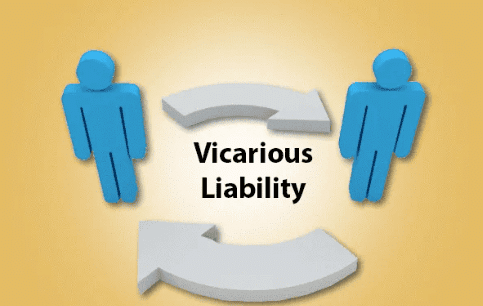Vicarious Liability - CLAT PDF Download
Definition

Vicarious liability refers to the legal responsibility of one person for the actions of another. This concept is applicable in various scenarios, including:
Liability of a Master for the Tort of His Servant
An employer can be held liable for the wrongful acts (torts) committed by an employee during the course of their work.Liability of Partners for Each Other's Tort
Partners in a business can be held responsible for the wrongful acts of each other done in the course of the partnership.Liability of a Principal for the Tort of His Agent
A principal can be held liable for the wrongful acts of an agent acting on their behalf.
Principal and Agent
Principal
A principal is an individual or entity who appoints another person to perform tasks on their behalf or represent them in dealings with third parties. By doing so, the principal allows the appointed person to bind them legally through the actions of the agent.
Agent
An agent is someone hired to perform specific tasks for another person or to represent them in interactions with third parties. The agent acts as a link between the principal and the third party, facilitating the execution of tasks or agreements.
General Rules of Law of Agency
Legal Maxim: Qui facit per alium facit per se
This means that the actions of an agent are considered the actions of the principal. The principal is responsible for all acts carried out by the agent within the scope of the agency.Delegation of Tasks
A principal can delegate tasks to an agent that they could perform themselves, except tasks of a personal nature.
Case Law: State Bank of India vs Shyama Devi
Background: Mrs. Shyama Devi opened a savings bank account with the Imperial Bank of India (now State Bank of India) in Allahabad.
Incident: Mrs. Devi entrusted a bank employee, Kapil Deo Shukla, with cash and a cheque for deposit. Shukla, based on personal relations, was entrusted without a receipt.
Misappropriation: Shukla cashed the cheque, misappropriated funds, and falsified passbook entries.
Legal Issue: Whether the bank could be held liable for Shukla's actions, as they were outside the scope of his employment.
Master and Servant Doctrine
- If a servant commits a wrongful act during the course of their employment, the employer (master) is also liable.
Conditions for Liability
- The tort must be committed by the servant.
- The servant must have committed the tort in the course of their employment.
Scope of Liability
An employer is liable not only for acts they expressly authorize but also for torts committed by the servant independently during the course of employment.
Liability of the Master for Different Types of Torts Committed by the Servant
1. Fraud of Servant
- Definition: When a servant commits fraud while performing duties, the master is liable.
- Case Law: Lloyd vs Grace Smith & Co.
A clerk fraudulently had a client sign a gift deed instead of investment documents. The employer was held liable.
2. Theft by Servant
- Definition: If a servant steals goods entrusted to him, the master is liable to the plaintiff.
- Case Law: Morris vs C.W. Martin & Sons Ltd.
A fur coat sent for dry cleaning was stolen by an employee. The employer was held liable.
3. Mistake of Servant
- Definition: When a servant's mistake causes loss to the plaintiff, the master is liable.
- Case Law: Bayley vs Manchester, Sheffield & Lincolnshire Railway Co.
A railway porter mistakenly removed a passenger from the correct train, causing inconvenience. The employer was held liable.
4. Negligence of Servant
- Definition: If a servant’s negligent actions cause loss, the master is liable.
- Case Law: Century Insurance Co. vs Northern Ireland Road Transport Board
A tanker driver caused a fire while carelessly transferring petrol. The employer was held liable.
5. Wrongful Delegation of Duties
- Definition: If a servant negligently delegates authority to another, the master is liable.
FAQs on Vicarious Liability - CLAT
| 1. What is vicarious liability in law? |  |
| 2. How does vicarious liability apply in tort law? |  |
| 3. What are the key elements required to establish vicarious liability? |  |
| 4. Are there any defenses against vicarious liability? |  |
| 5. Can vicarious liability apply to independent contractors? |  |














